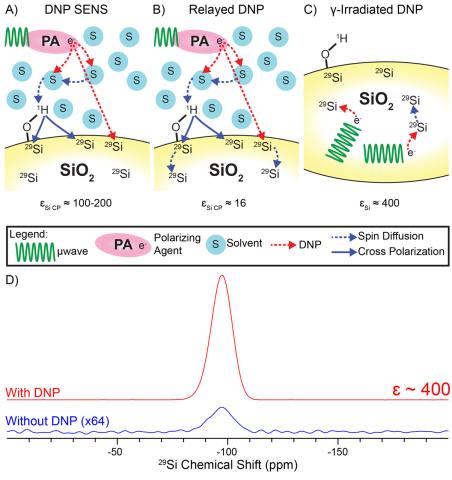
High-field magic angle spinning dynamic nuclear polarization (MAS DNP) can enhance the sensitivity of solid-state nuclear magnetic resonance (ssNMR) spectroscopy experiments by orders of magnitude. In a DNP experiment, the high spin polarization of unpaired electrons is transferred to nuclear spins. The unpaired electron spins for DNP are usually provided by exogenous organic radicals (e.g., TEMPO, trityl, etc.). However, for many materials, there is no way to introduce exogenous radicals to allow NMR signals from the bulk to be amplified. This contribution demonstrates that γ-irradiation induces the formation of stable radicals in silica-based glasses and organic solids such as sugars and polymers. The radicals were then used to polarize 29Si or 1H spins uniformly throughout these non-porous materials. Significant MAS DNP enhancements greater than 400 and 30 were obtained for fused quartz and glucose, respectively. These results demonstrate that ionizing radiation is a promising method to generate stable radicals for DNP in previously inaccessible bulk materials such as non-porous inorganic solids and insoluble polymers.
S.L. Carnahan, A. Venkatesh, F.A. Perras, J.F. Wishart, A.J. Rossini.* High-Field MAS Dynamic Nuclear Polarization Using Radicals Created by γ-Irradiation, J. Phys. Chem. Lett. 2019, 10, 4770−4776, DOI: 10.1021/acs.jpclett.9b01655.
